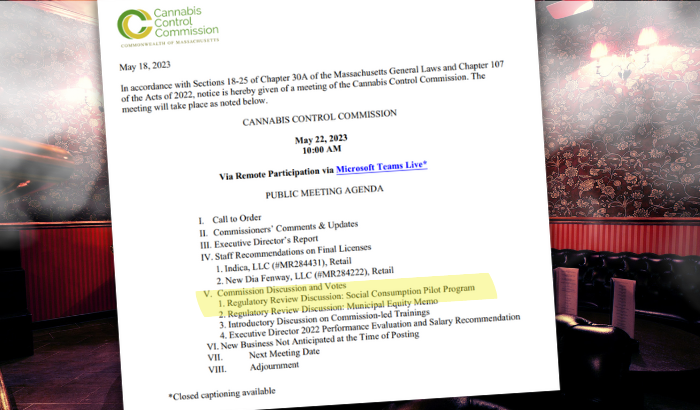
Commissioners say the move “eliminates additional step that lengthens the timelines of the regulation process”
“Our approach to the creation of the pilot program doesn’t align with the voice of the legislature and communities. … We did not see a value in how the pilot program was laid out.”
Commissioner Bruce Stebbins outlined the focus of this morning’s special meeting of the Massachusetts Cannabis Control Commission. Along with fellow Commissioner Nurys Camargo, Stebbins recently wrangled a social consumption working group to assess a “pilot program licensing primary-use social consumption establishments (cannabis cafes) and event host licenses (events open to the public)” that was conceived in 2019.
That program put in place a strategy to initially open up “a maximum of twelve municipalities, each of which may implement its own cap on each type of license.” The “primary attributes of the pilot program” included: “a limited number of participating communities; licenses for groups that have thus far been locked out of the legal cannabis industry; stringent application and operational requirements; a strong focus on staff training; and robust data collection by both businesses and state and local regulators.”
Over the past few months, though, commissioners—as well as many Social Equity applicants and advocates, who the pilot was intended to uplift—have come to feel the program was misguided. In addition to unreasonable restrictions including a ban on indoor smoking, the pilot also “creates significant and unnecessary uncertainty for potential license applicants and potential host communities,” according to the group Equitable Opportunities Now (EON), which “educates for and empowers people of color to become active participants in the Massachusetts legal cannabis market.”
EON published an open letter regarding the social consumption pilot ahead of Monday’s meeting noting how “by artificially limiting the number of communities that could potentially host a social consumption establishment and empowering the CCC to pick winners and losers, the Commission will unknowingly prevent potential local business operators from disparately harmed communities from exploring the opportunity and discourage potential host communities from working with interested operators.”
In her comments prior to the vote to scrap the pilot, Commissioner Camargo said, “If we keep the pilot or we manage to have a cap on licensees, then we ourselves will be creating more barriers.”
Stebbins said their working group was focused on “public health, public safety, and social equity,” as well as “approaching the regulatory process with thoughtful diligence,” “getting it right the first time,” and “engaging stakeholders and working in collaboration” to create “lucrative and successful license types.” They also took into account how “the Legislature, when it revised the cannabis laws in August 2022, set forth a process for municipalities to opt into social consumption license types, either through a ballot question or ordinance,” and that the “Act does not require the Commission to set limits on the number of municipalities that may host social consumption licensees.”
All things considered, the working group concluded that removing the pilot program “eliminates additional step that lengthens the timelines of the regulation process,” “aligns with the voice of the legislature and communities,” and gets the commission out of the business of licensing communities. The commissioners largely agreed; “I am not wedded to the pilot program,” Chair Shannon O’Brien said. “I am not wedded to any infrastructure that allows us as a commission to create a separate license for communities.”
Following an hour-long discussion on the matter, commissioners voted to abandon the pilot program. Instead, the CCC will devise a universal framework for all applicants in any municipality that decides to “opt into social consumption license types, either through a ballot question or ordinance” after those types are established by the CCC.
Commissioner Kimberly Roy, who was the lone member to vote present, questioned whether they should eliminate the pilot at this point, and asked what will come of local control over social consumption. To which Stebbins responded that’s a “local control issue … Local zoning is going to be local zoning.” Roy also noted how a fund for Social Equity applicants will only likely have $15 million to $20 million, and asked, “We have limited capital here, so how do we create impact?”
Regarding an exclusivity period for Social Equity and/or other designated groups of applicants, Stebbins said, “There is additional work that will be ongoing,” and “everything is on the table.” “We’ll have to make decisions about the exclusivity period in our new regulations,” he added.
Throughout the meeting, commissioners discussed social consumption models in other states, to the extent that they even exist. As Chair O’Brien remarked, Colorado still has fewer than five on-site consumption venues, while Camargo explained how that state is still “trying to figure out where social consumption will fall in the regulatory framework.” For example, they’re working with licensees to figure out how a bus that picks people up at the airport and taxis them between dispensaries might work.
CCC Executive Director Shawn Collins said that while “a lot of the substance still needs to be worked out,” there is not currently a “blueprint or a template out there that the commonwealth can just adapt to Massachusetts.”
As for steps for regulating social consumption moving forward, EON wrote in its letter ahead of today’s CCC meeting: “The CCC has many important decisions to address in creating an equitable, safe, healthy, and prosperous social consumption regulatory framework and has a significant opportunity to create a market in which those most harmed by the war on drugs can thrive.”
Furthermore, “The Commission and the public will have big discussions about the Legislature’s decision to authorize indoor smoking and the conflicting previous recommendations between the MCAB and the CCC, as well as new information that has emerged over the past 5 years,” and “will have to grapple with how many and what kinds of social consumption licenses to create, from one-day and short-term event licenses to cafes and bakeries within new and/or existing establishments, to outdoor patios, to indoor smoking lounges – and likely others arise from public input.
“For each type of license,” EON wrote, “it is critical that the CCC and its Social Consumption Working Group have the opportunity to develop regulatory recommendations that promote health, safety, and social justice without being limited to the previous pilot program framework.”
In a statement following the vote, EON Policy Co-Chair Armani White issued the following statement:
“We applaud the Cannabis Control Commission’s vote to remove the current pilot program and focus on a long term regulatory and application framework centered on equity, health, safety, and viability. We appreciate Commissioners Camargo and Stebbins’ leadership on this issue and the thoughtful discussion of the full Commission under Chair O’Brien’s leadership.”
White added, “We look forward to working together to ensure that this exciting new license type creates meaningful opportunities for communities most harmed by the war on drugs.”
























